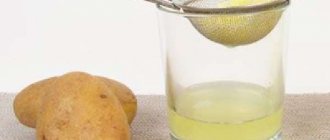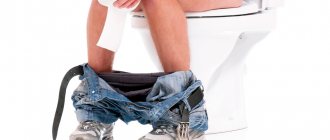What is lazy gut
Normally, an adult has bowel movements from 3 times a day to 3 times a week. Stool less than 2 times a week indicates that the intestinal part of the digestive tract is not working well.
Lazy or sluggish bowel is a lack of smooth muscle tone, in which peristalsis in the colon is impaired. As motility deteriorates, it becomes impossible to move feces towards the anus. This is how constipation occurs, which in medicine is called constipation or obstipation.
With a lazy bowel, stool retention is usually chronic. We can talk about the presence of a problem if there is no urge to defecate for more than 3 days.
Use of medications
If an active lifestyle and correction of the diet do not help the patient normalize intestinal function, he should seek help from a qualified specialist. Constipation often occurs due to the development of any concomitant diseases in a person. Only a doctor can diagnose them, so you should not postpone a visit to him.
Sometimes poor intestinal permeability occurs as a result of the presence of a malignant tumor in it. Increasing in size, it interferes with the normal movement of feces and makes the process of defecation difficult. Treatment of malignant tumors is performed surgically. The sooner a person consults a doctor, the greater the chance of recovery.
People suffering from constipation often have to resort to taking laxatives. But it is impossible to cure a lazy intestine with these drugs.
Regular use of such drugs weakens intestinal motility and makes the evacuation of its contents even more difficult. In order not to harm the body, you need to take laxative medications for a short period. The only exceptions are drugs based on lactulose and intended for people suffering from chronic constipation.
Medications for the intestines help it begin to function normally. The doctor usually prescribes laxatives based on medicinal plants - “Senade”, “Senalex”, “Gerbion Laxana”. The senna extract contained in these preparations significantly facilitates bowel movements.
Rectal peristalsis is enhanced with sodium picosulfate-based products. These are drugs for the intestines such as “Slabicap”, “Guttalax”, “Laxigal”, “Guttasil”, “Slabilen” and many others. Thanks to their action, the intestinal muscles begin to contract, and the absorption of liquid from food waste also decreases.
These medications should not be taken for too long, because the intestines may forget how to empty themselves.
Provoking factors
Lazy bowel syndrome is often a consequence of the following reasons:
- deficiency of dietary fiber in the diet;
- insufficient fluid intake;
- sedentary lifestyle (hypodynamia);
- long-term use of laxatives;
- untimely bowel movements;
- hormonal changes during pregnancy;
- chronic diseases of the gastrointestinal tract and genitourinary system.
Coarse fiber contributes to irritation of the colon mucosa. This in turn leads to improved peristalsis. Therefore, the lack of plant fiber in the daily diet is one of the main reasons for the development of lazy bowel syndrome.
Daily water consumption of less than 1.5 liters also helps to reduce the motor activity of the colon.
With a sedentary lifestyle or prolonged bed rest, metabolism is disrupted and muscle tone, including intestinal muscles, decreases.
Most laxatives are addictive. With a long course of medications for constipation, the large intestine loses the ability to contract on its own and becomes sluggish.
Regular suppression of the urge to empty causes disruption of the innervation in the distal digestive tract.
Lazy bowel syndrome often occurs in pregnant women and women after childbirth. This is due to the action of hormones that reduce peristalsis.
Effective Treatments
Treatment for lazy bowel syndrome begins with eliminating the causes of digestive problems. It is very difficult to restore the functioning of the gastrointestinal tract on your own.
Complex therapy involves the use of medications, traditional recipes, physical therapy and massage. At the same time, it is important to adjust your diet and establish its regime.
Medicines and vitamins
You should not use laxatives if there are cracks or tumors in the anus or intestine itself. In the absence of these pathologies, the following medications are recommended:
- Tablets and suppositories "Bisacodyl", "Dulcolax". They increase mucous secretion by irritating receptors in the rectum. Allowed for use by adults and children over 2 years of age.
- Glycerin suppositories. Excellent for liquefying feces and promoting their elimination. Due to their mild effect, they can be used by pregnant and lactating women.
- Candles "Ferrolax", "Calciolax". They promote natural bowel movement and have no contraindications.
- Regulax tablets. Induces bowel movement after approximately 7 hours. They are used in extreme cases so as not to aggravate the situation.
- Probiotic "Poslabin Lactulose". Restores intestinal microflora, normalizes digestion and stool regularity.
Therapy for lazy bowel syndrome involves treatment with vitamin complexes. They prevent constipation by facilitating the passage of stool. Magnesium and vitamins C and B are usually prescribed.
Folk recipes
You can make your intestines work using unconventional means. Popular recipes include the following methods:
- Flax-seed. 2 teaspoons of grains are infused in 200 ml of boiling water overnight. Add a few raisins, one tablespoon of honey and grated carrots to the mixture. The mixture is taken one large spoon twice a day.
- For the following recipe you need to take 25 g of plants: mint, dill seeds, caraway fruits, valerian root. All ingredients are mixed. Two tablespoons of the composition are poured into two glasses of boiling water, infused and cooled. Before taking, filter the mixture and drink one glass twice a day.
- Dandelion root is good for constipation. It is necessary to pour the crushed plant in the amount of two teaspoons into one glass of cold water. After 8 hours, filter the drink and drink 50 ml 4 times a day before meals.
Sour milk with honey helps a lot. You need to drink 1 glass of yogurt, kefir or fermented baked milk with sweet nectar before bed.
Massage
Abdominal massage is helpful for loose bowel syndrome. The legs are bent at the knees and the stomach is stroked with light movements in a clockwise direction. This massage should be performed every day immediately after therapeutic exercises. The procedure is especially useful for infants with constipation.
Enema
An enema is a well-known method of cleansing the intestines. It is carried out twice a month using 1–1.5 liters of water. For a small syringe, prepare the following solution: 1 glass of water to 2 teaspoons of salt. You can add a little olive oil to the composition. The water must be cool. You can go for colon hydrotherapy, which is a modification of enema therapy and is carried out using a special device. Abuse of enema provokes the development of intestinal dysbiosis and stretching of the walls of the rectum. Therefore, you should consult your doctor before using this method.
Exercises
You can activate the work of a lazy intestine with the help of special gymnastics. The following exercises will help you cope with the problem:
- Lie down on a flat surface, lift your body forward and remain in this position for several seconds. Repeat 5 times.
- Lying on your back, spread your legs and arms. The knees are pulled to the chest and try to touch the forehead, taking them with your hands. Do it 5-6 times.
- Squat with a straight back 5 times. At the same time, the arms are extended forward.
- While kneeling, bend your elbows and lean on them. Alternately raise your legs up 7 times each.
- Breathing exercises will help cure the pathology. They try to hold their breath through a deep breath for 5 seconds, then relax and exhale the air. The procedure is carried out 10 times.
In combination with massage, these exercises will reduce stress, eliminate intestinal sluggishness and tidy up the gastrointestinal tract as a whole.
Nutrition
It is important to make the intestines work. To do this, you need to eat food with a lot of fiber: asparagus, cabbage, carrots, prunes. Don't forget about beans. Olive oil should be used as fat. It is forbidden to eat sausages. You need to give up sugar, spices, sauces, fatty meats and cheeses, white bread and alcohol.
To maintain the frequency of stool output, you should follow a diet. You need to eat at certain times. You need to drink at least two liters of water per day.
A proper diet alone is usually not enough to normalize stomach function.
Diagnostics
Symptoms and treatment of sluggish peristalsis should be determined by a doctor based on the results of the diagnosis.
Since lazy bowel is not an independent disease, it is necessary to determine the cause of its occurrence. The patient is advised to consult a gastroenterologist, who conducts a survey about the patient’s lifestyle: eating habits, physical activity. The doctor must also find out the presence or absence of chronic pathologies.
Diagnosis of intestinal atony includes the following measures:
- coprogram;
- colonoscopy;
- stool analysis for dysbacteriosis;
- study of thyroid hormone levels;
- radiography of barium passage.
If after the measures taken the cause of atony is not determined, the patient is advised to consult a psychotherapist and a neurologist. The task of specialists is to exclude the presence of psychogenic lazy bowel syndrome.
Diet
How to normalize the intestines? To do this, you must adhere to the following diet:
- Thirty minutes before meals, it is recommended to drink a glass of cold water;
- Fiber or bran, which are available in the form of bioactive additives, should be added to food;
- eat foods high in fiber: special bread, greens, carrots, cereals, cauliflower and seaweed, broccoli, corn;
- it is necessary to include in the diet raisins, dried fruits, prunes, figs, sprouted wheat, nuts, apples, oranges, honey, dairy products;
- you should drink two liters of fluid every day, no less;
- It is strictly forbidden to consume jelly, stringy meat, cocoa, enveloping cereals, slimy soups, flour dishes, chocolate, refined oil.
How to make a lazy bowel work
Treatment of a lazy intestine comes down to correcting nutrition (table No. 3) and doing health-improving gymnastics.
To enable the functioning of the intestinal tract, it is additionally recommended to massage the abdomen.
The doctor may prescribe a course of prokinetics or laxatives that improve peristalsis.
Diet
The main goal of a therapeutic diet for atony of the intestinal tract is to restore its motor activity.
The diet includes foods that contribute to mechanical or chemical irritation of the intestinal mucosa. High-carbohydrate foods, which provoke fermentation processes in the digestive tract, are removed from the daily menu.
A diet for a lazy gut involves eating the following foods:
- porridge;
- vegetables;
- fruits;
- fermented milk drinks;
- lean meats and fish;
- fresh juices.
Of the porridges, the most unhealthy are buckwheat, barley, wheat, and oatmeal. It is recommended to cook cereals with water or with the addition of a small amount of milk. Porridges are supplemented with a piece of butter and dried fruits.
Vegetables and herbs with sluggish peristalsis are consumed in any form: fresh, stewed, boiled.
Vegetable salads are seasoned with unrefined vegetable oil. Soups are prepared with weak fish or meat broth.
Potato consumption is kept to a minimum due to the large amount of carbohydrates and the ability of the product to cause fermentation processes.
Lean meat or fish is eaten boiled or baked. Fried foods are completely contraindicated. For protein foods, you can also eat soft-boiled eggs or as an omelet.
Fruits and berries are consumed both fresh and dried. Dried fruits include dried apricots, prunes, and figs.
It is recommended to include honey in the diet for sluggish peristalsis. This product has a mild laxative effect.
Drinks include fruit and vegetable juices prepared independently, and dried fruit compotes. In addition, be sure to drink water, at least 1.5 liters per day.
Exclude flour, confectionery, legumes, fried foods, smoked foods, canned food, excessively salty, spicy foods, and strong tea from the diet.
The treating gastroenterologist will help you create the correct menu for every day from permitted food products.
Physical exercise
Therapeutic exercises will help make the intestines work. Strengthening peristalsis is facilitated by such types of exercises as abdominal press, “bicycle”, lifting and spreading the legs to the sides from a lying position.
Why is this happening?
- Diseases of the intestine in which its work is weakened. For example, congenital diseases (dolichosigma, Hirschsprung's disease). Also, some diseases are accompanied by so-called stool phobia: a person is literally afraid to perform an act of defecation due to pain (for example, with anal fissures). The most dangerous and formidable cause is malignant intestinal tumors.
- But more often the reasons are functional: in the elderly, the intestines, like all other organs, undergo involutional changes. This leads to the fact that the intestines begin to become lazy and their work slows down.
- Now let’s look at the most common factors for the development of “lazy bowel” syndrome: insufficient physical activity (physical inactivity, sedentary lifestyle), drinking insufficient amounts of fluid, ingesting a small amount of dietary fiber (fiber) or, worse, its complete absence. And let's not forget about dysbiosis!
It is possible and necessary to fight a lazy intestine. It is for this purpose that a special diet for a lazy intestine was developed. What is its essence? And what do you need to eat to get your intestines working again?
- To begin with, make it a rule to drink enough clean water (not in the form of tea, coffee, juices!). To find out how much water you need, multiply your weight (for example, 60 kg) by 40. It turns out 2400 ml, or 2.4 liters of water. Drink it half an hour before meals, two hours after.
- Eliminate strong coffee from your diet. This is especially true for those who drink it in “liters”. Coffee is a drink that slows down our bowel movements.
- In addition to water, kefir and other fermented milk products containing live bacteria will be very useful. They will help populate the intestines with “good” bacteria, and, therefore, improve digestion.
- For breakfast, eat oatmeal (you can also have it with milk). They have a very beneficial effect on a lazy intestine.
- Try to eat less flour (bread, pastries). When it comes to bread, give preference to those with bran and whole grains.
- If you suffer from lazy bowel syndrome, then you simply need to make friends with fresh vegetables and fruits. What is healthy to eat from vegetables? Cabbage (cauliflower, white cabbage, sea cabbage), beets, carrots, cucumbers. These vegetables are like a brush for the intestines: they clean it and make it work. As for fruits, give preference to apples, apricots, pears, and grapes. In general, it is generally accepted that a person needs 400-500 grams of fresh vegetables and fruits per day.
- Raisins, figs, and prunes will also be good for intestinal function.
- Avoid large amounts of fats (oils, fatty dairy drinks, fatty meats and fish).
A diet for a lazy intestine will not require strict dietary restrictions from you. Just get into the habit of drinking a lot. Find interesting and varied recipes for vegetable and fruit salads. The diet will help make the lazy intestines move and move fecal matter out of the body. If you follow it for at least one or two weeks, you will definitely notice the result. Remember that regular bowel movements are essential! This is the prevention of many diseases, including cancer.
Proper bowel function is one of the most important components of human health. Unfortunately, the number of people suffering from constipation is very large; in developed countries, up to 50% of the adult population faces this problem.
What is constipation?
Constipation is a slow, difficult or systematically insufficient bowel movement.
Usually we talk about constipation if bowel movement does not occur for more than 48 hours. Constipation occurs especially often in young children, older people and pregnant women. Constipation occurs 3 times more often in women than in men. As in the case of women, “lucky” again...
Almost every person faces this problem. For example, almost everyone experiences constipation during travel, under stress, or after surgery. Such constipation is not considered a disease and goes away on its own when the person returns to normal conditions.
If stool retention recurs frequently and becomes a habitual occurrence, careful diagnosis and treatment is necessary.
Causes of constipation in adults
In adults, constipation occurs as a result of dysfunction of the colon and is caused by disruption of the processes of formation and movement of feces through the intestines as a result of various reasons. Here are the main ones:
Habits and lifestyle
The act of defecation consists of two components: involuntary (reflex) and voluntary (which depends on the will of the person). When we wake up in the morning and take a vertical position, the feces accumulated during the night begin to put pressure on the lower parts of the rectum, which causes the urge to defecate. This is the most physiological rhythm of bowel movement. If a person suppresses this reflex due to various circumstances, then for a further urge to defecate, a denser filling of the large intestine is necessary, which provokes constipation.
What causes suppression of the defecation reflex:
- morning rush and skipping breakfast
- unfamiliar surroundings
- overloaded workday
- ignoring the feeling of colon fullness
- bed rest
- inappropriate conditions and time for defecation.
Poor nutrition
The daily diet contains an insufficient amount of foods rich in fiber and plant fibers, combined with insufficient fluid.
Sedentary lifestyle
Sedentary work, lack of physical activity during the day.
Psychogenic factors
Stress, depression, conflict situations, mental stress, various fears, prolonged violations of the daily routine and rest, all this provokes constipation.
Diseases of the gastrointestinal tract
Dysbacteriosis, peptic ulcer, chronic pancreatitis, irritable bowel syndrome, intestinal tumors are often accompanied by constipation.
Anal diseases
Hemorrhoids, paraproctitis, anal fissures, accompanied by severe pain, prevent defecation and cause constipation.
Endocrine system diseases
Hypothyroidism, diabetes mellitus, etc.
Nervous system diseases
Stroke, spinal cord injuries and tumors, multiple sclerosis, Parkinson's disease.
Medications
Taking some medications (atropine, soda, almagel, and many others) have side effects such as constipation.
Pregnancy
2/3 of pregnant women suffer from constipation.
What happens with constipation
Constipation occurs as a result of relaxation and stretching of the intestines or if there is an obstacle to the movement of stool.
Constipation symptoms
Flatulence, bloating, pain and feeling of fullness in the abdomen, belching, retention of stool and gas, loss of appetite, heartburn, bad taste in the mouth, bad breath, coating on the tongue, painful defecation, “sheep feces” (dry compacted feces in in the form of dark balls or lumps). When the abdomen is bloated, heart pain and palpitations may occur. The general condition worsens, headaches, dizziness appear, sleep is disturbed, and general nervousness occurs.
Constipation is often accompanied by deterioration of the skin, it becomes dry, flabby, pale with a yellowish tint, and pimples appear. All this is caused by intoxication, which occurs as a result of prolonged constipation.
Diagnostics
To effectively combat constipation, it is necessary to establish its causes, so it is advisable to consult a doctor. The doctor will prescribe the necessary tests and examinations for you. Constipation is not a disease, but a symptom of some disease or a temporary condition caused by the above reasons.
Why is constipation dangerous?
Constipation is far from harmless and can lead to serious complications. Here are some of them: intestinal obstruction, colonic diverticulosis, rectal prolapse, hemorrhoidal bleeding. And another reason why you need to take constipation seriously is that constipation is often the first sign of serious diseases of the gastrointestinal tract, endocrine system, and even cancer. Early diagnosis of identified diseases will increase the effectiveness of their treatment and give a chance for recovery.
Long-term constipation can lead to such a serious complication as colon cancer. This occurs when, under the influence of carcinogenic substances formed in the intestines during prolonged stagnation of its contents, a tumor begins to develop in the colon.
Treatment of constipation
Given that constipation can have many causes, a combination of different treatments is used to treat it. The treatment prescribed by the doctor can be supplemented with a few simple tips for every day, which you can also use to prevent chronic constipation.
Constipation develops due to a lack of water in the body. The intestinal contents become dense, move poorly and stagnate in the intestines. With a lack of water, digestive juices are secreted worse, digestion slows down, which means food takes longer to digest and remains in the intestines longer. You need to drink at least 1.5 liters of clean water per day. The water should be warm (36 - 38 O), drink it in small sips, in between meals (15 minutes before meals and 30 - 40 minutes after meals).
To prevent and treat constipation, it is good to drink 1 – 2 glasses of warm water immediately after waking up; this will help “wake up” the intestines and make them work.
Warm water causes bile to be released, which in turn enhances intestinal motility and accelerates bowel movements.
Eat right.
Include more raw vegetables and fruits in your diet. On your table every day you should have: cabbage, beets, beans, carrots, apples, pears, wholemeal or bran bread. Reduce refined foods and cooked foods in your diet.
For constipation, it is very good to include seaweed salads in your menu every day. In addition, plums, prunes, apricots, bananas, avocados, figs and papaya will help.
Before going to bed, it is advisable to drink yogurt, fresh kefir or live yogurt.
Cheese.
Products such as cheese, cottage cheese, and milk contain a protein called Casein, which, despite all its beneficial properties, is absorbed very slowly and reduces intestinal motility. But it is worth noting that for a certain type of people, dairy products can also cause the opposite effect. Such controversial products also include coffee, apples, berries and bananas.
Black tea.
Black tea is considered a remedy for diarrhea; due to its “strengthening” effect, its use is undesirable for constipation.
Include olive oil in your diet.
If you are prone to constipation, add olive oil to your meals (especially salads). You need 2-3 tablespoons of this wonderful oil per day. It is very useful for digestion, improves intestinal motility, stimulates the production of bile acids, which activate intestinal receptors, motivating it to contract better.
Chew your food slowly and thoroughly.
Well-chewed food is better digested in the digestive tract. With prolonged chewing, enzymes involved in the digestion process are activated and food is better digested. Monitor the condition of your teeth, treat them on time, and, if necessary, get dentures. Very often, having eliminated your dental problems, you will also eliminate the problem of constipation.
An active lifestyle is the enemy of constipation!
When you move, you need more energy, and in order to get this energy, the intestines begin to digest food more actively and more fully and move it towards the exit. In people leading a sedentary lifestyle, intestinal motility is impaired, food stagnates for a long time and is poorly digested, the intestines work sluggishly and constipation occurs.
Here are a few exercises that will revive your bowel function:
- Lying on your stomach, alternately lift your legs and upper torso at the same time. Repeat 10 – 20 times. It is better to do this exercise in the morning, on an empty stomach, immediately after waking up. Perform smoothly, without jerking.
- Then get back on your feet and squat 20 to 25 times at a slow to moderate pace. These exercises increase intra-abdominal pressure and promote the passage of intestinal contents.
Do a belly massage.
If your intestines are lazy and don’t want to get back to work, try giving yourself a abdominal massage. It is advisable to do the massage in the morning, after emptying the bladder.
- Using circular massage movements with three fingers, rub the area of the sigmoid colon (below the navel on the left).
- Massage your abdomen clockwise with light pressure. Continue the massage until intestinal peristalsis appears. For best results, massage with olive oil.
How to confirm the presence of pathology
Many adults, at the first suspicion of a disease, begin to uncontrollably take various vitamin complexes, probiotics and laxatives. Unfortunately, such treatment often causes unpleasant complications (including ulcers and gastritis). Before starting therapy, it is important to consult with an experienced gastroenterologist and make sure that the problem really exists.
Common symptoms of lazy gut:
- bad breath;
- skin rashes, dermatitis and other signs of an allergic reaction;
- problems with bowel movements (constipation);
- lack of appetite;
- deterioration of the condition of the skin, hair, nails.
Unfortunately, the described manifestations are typical for many gastrointestinal diseases, so it is important to perform a correct diagnosis. In addition to the mandatory examination and questioning of the patient, palpation of the abdomen is performed. Fears can be confirmed or refuted using hardware research. Most often, treatment of “lazy bowel” in adults is based on the results of ultrasound, colonoscopy, and magnetic resonance imaging.











